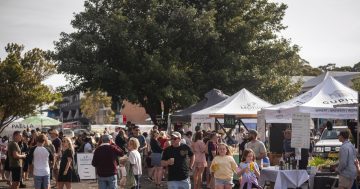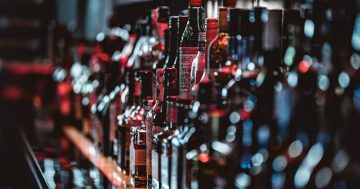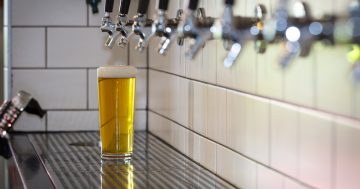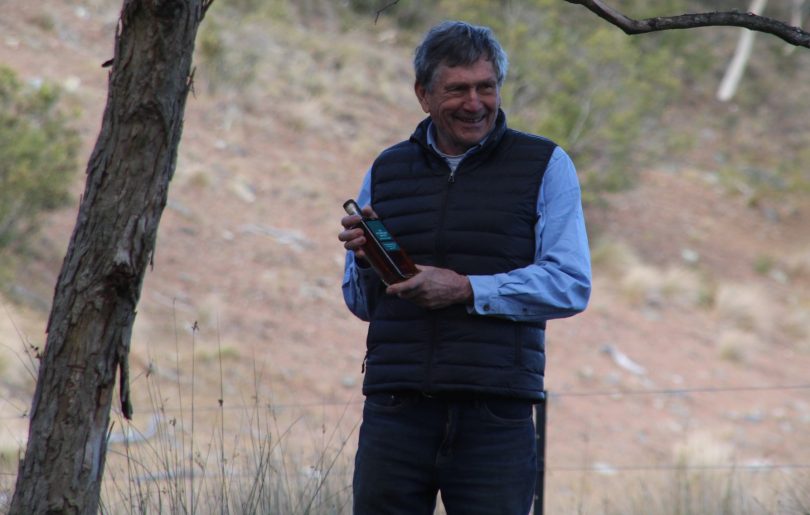
Martin Pye at Riverbourne. Photos: Alex Rea.
At the head waters of the Molonglo River, in the hills of Jingera not far from Captains Flat, a small distillery is producing fine Whisky. The Riverbourne Distillery is the passion of former Canberra pharmacist Martin Pye.
Taking on distinct character of the local environment, the river and rain water play an important part of the end product.
Before heading down stream to Lake Burley Griffin, the Molonglo is fed by natural springs at an altitude of 1000 metres – an environment akin to many areas of Scotland.
Having moved out to the Riverbourne property ten years ago, Martin and his wife Eileen Moriarty have been busy with cattle, goats, chooks (Long Paddock Eggs) and dogs (Eileen organises the Trans Tasman Working Dog Trials in Bungendore.) Both come from farming backgrounds and are interested in locally made produce.
Not one to be idle in ‘retirement’, Martin established and licensed The Riverbourne Distillery in 2015 and laid down his first barrels in 2016.
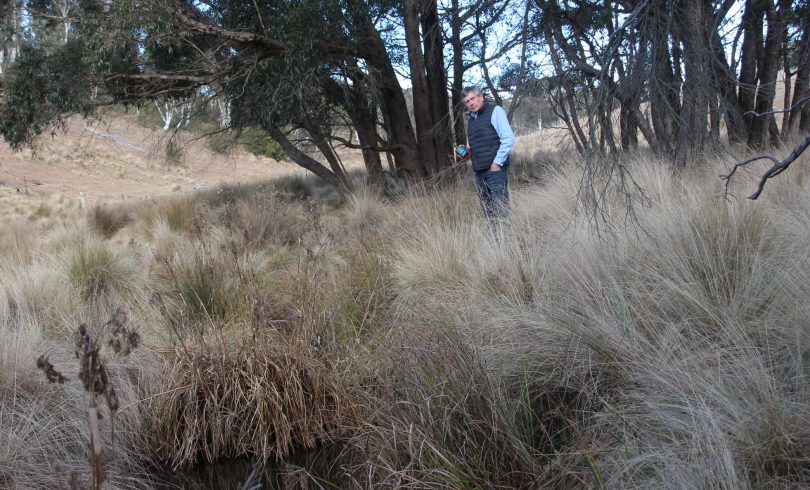
Martin Pye at the headwaters of the Molonglo River.
It was after a trip to Tasmania, the spiritual home of Australian Single Malt Whisky, that Martin decided to launch his own distillery, crafting world class whisky, rum and other spirits. Martin studied with Dean Jackson from Redland’s Distillery, a course designed by the father of Tasmanian whisky, Bill Lark. As a third-generation pharmacist, Martin has studied microbiology, biochemistry, chemistry and mathematics – a handy skill set for a distiller.
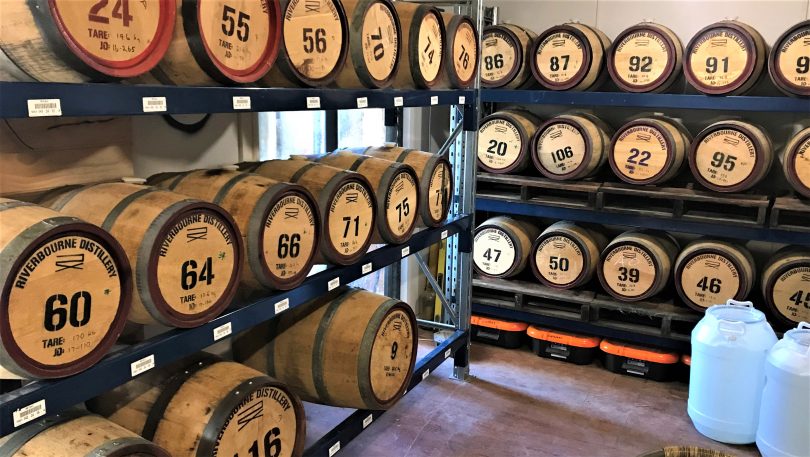
The whisky has to be in the barrel for at least two years.
The boutique distillery is a one man show, mashing, fermenting, distilling and ageing his range of boutique whiskies and rums with the utmost attention to detail.
A 900-litre copper still sits at the heart of the distillery. It is emblazoned with the company logo which, as a stylised version of a prescription ‘signature’, is a nod to the pharmacist’s journey. The Logo is a stylised R based on the Egyptian eye of Horus, which became the recipe sign for prescriptions. Pye says, “as a 3rd generation pharmacist, [it] seemed appropriate.”

The Logo is a stylised R based on the Egyptian eye of Horus, which became the recipe sign for prescriptions.
The distillery currently has over 50 French and American oak barrels of rum and whisky ageing for the required minimum of two years. The next release will be ready for a festive dram by Christmas 2018.
Martin says “The natural spring waters, climate and mountainous environment produce spirits with a unique flavour profile distinctive to the region.”
In June, Martin attended the ‘Whisky Freedom’ conference in Perth with his ‘Riverbourne Identity’ and ‘Riverbourne Supremacy’ Whiskies, meeting fellow distillers and enthusiasts, and sampling whiskies from Scotland, Ireland, India, Japan, America, France, Italy and Australia along with some craft rums and gins. The feedback has been good.
The Distillery also produces premium vodka and rum. The first of the rum, lovingly matured in an ex port cask, was bottled just a few weeks ago. “Riverbourne Rum” is a dark rich sipping rum at 48% ABV and $100 for 700 ml.
With the current craze for premium local spirits such as gins, The Riverbourne Distillery offers a unique taste of the Capital Region. Martin is enthusiastic at his new ‘career’ and is looking forward to releasing more product to the local market as it matures.
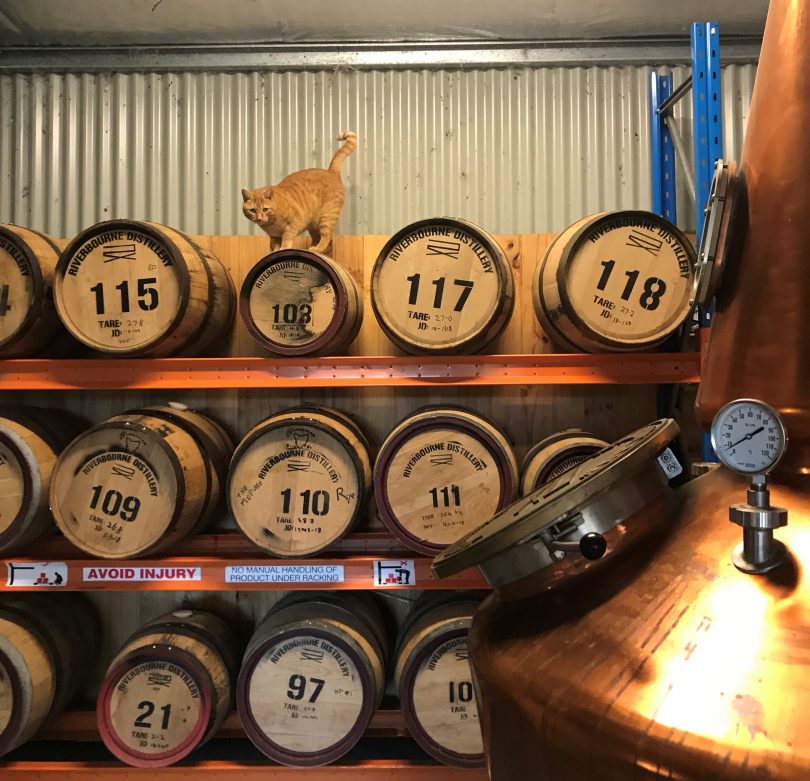
The Distillery Cat Ginge keeps a close watch on the barrels.
Martin says, “My passion for the craft has kept me highly motivated for the last few years, but now the reality of no income has become a focus. For two years everything has to be paid ahead in the hope that the resulting income will eventuate.”
There has been a long gap since early days when Bill Lark was the first to open a distillery in the Canberra region in 1992.
You are not likely to pick up a bottle from the Riverbourne Distillery at your local bottle shop. Currently sales are conducted online only at $175 a bottle. “We are intending to market online and also attend local markets. We are also interested in selling to local bars” says Martin.
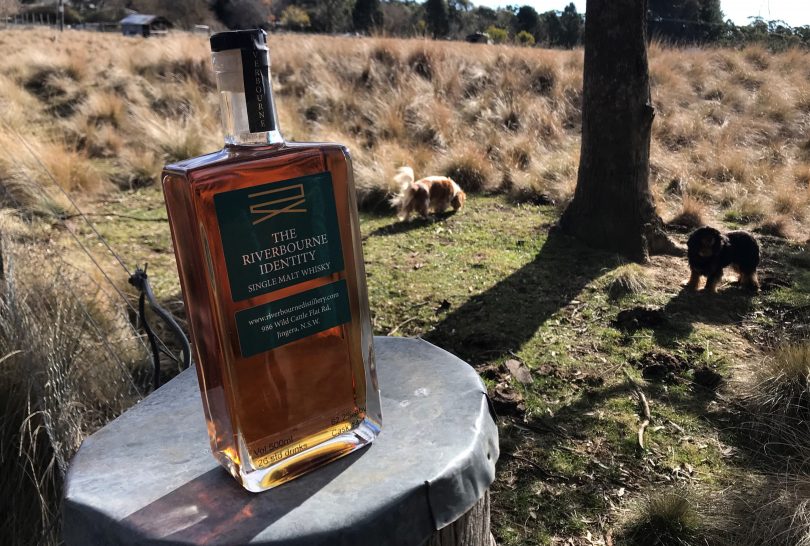
Just what the Doctor ordered? The Riverbourne Identity Single Malt Whisky.
What is a single malt whisky?
A single malt whisky is one in which the whisky comes from a single distillery (The “Single”). The grain from which the whisky is made is 100% Malted Barley. (The “Malt”). Blended whisky, usually referred to as “Scotch”, uses a variety of different grains in addition to malt, such as wheat, and corn, (Irish whiskey often contains oats, – note the “e” in whiskey). The whisky is cured for a minimum of three years in oak casks. Then the companies (such as Johnnie Walker) buy the malts from various distilleries and blend them to create their spirit, achieving a consistency.
For more information, visit: www.riverbournedistillery.com







